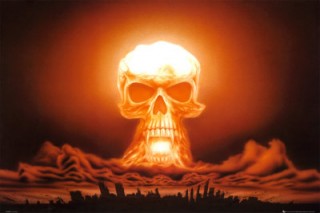 The Department of Defense just released its Nuclear Posture Review, “reflecting the President’s overarching view of U.S. nuclear strategy.”
The Department of Defense just released its Nuclear Posture Review, “reflecting the President’s overarching view of U.S. nuclear strategy.”
The new policy narrows the range of circumstances under which the president would use nuclear weapons, and calls for the enforcement of the Nuclear Non-Proliferation Treaty.
Israel is very upset that about this development, saying it will register its concerns when Prime Minister Binyamin Netanyahu attends next week’s nuclear summit in Washington. (Jerusalem Post).
Israel does not officially admit to its possession of nuclear weapons and refuses to allow WMD inspectors inside of its weapons facilities, something Israel fears it may be forced to do under the changed policy.
The President’s statement:
One year ago yesterday in Prague, I outlined a comprehensive agenda to prevent the spread of nuclear weapons and to pursue the peace and security of a world without them. I look forward to advancing this agenda in Prague this week when I sign the new START Treaty with President Medvedev, committing the United States and Russia to substantial reductions in our nuclear arsenals.
Today, my Administration is taking a significant step forward by fulfilling another pledge that I made in Prague—to reduce the role of nuclear weapons in our national security strategy and focus on reducing the nuclear dangers of the 21st century, while sustaining a safe, secure and effective nuclear deterrent for the United States and our allies and partners as long as nuclear weapons exist.
The Nuclear Posture Review, led by the Department of Defense, recognizes that the greatest threat to U.S. and global security is no longer a nuclear exchange between nations, but nuclear terrorism by violent extremists and nuclear proliferation to an increasing number of states. Moreover, it recognizes that our national security and that of our allies and partners can be increasingly defended by America’s unsurpassed conventional military capabilities and strong missile defenses.
As a result, we are taking specific and concrete steps to reduce the role of nuclear weapons while preserving our military superiority, deterring aggression and safeguarding the security of the American people.
First, and for the first time, preventing nuclear proliferation and nuclear terrorism is now at the top of America’s nuclear agenda, which affirms the central importance of the Nuclear Non-Proliferation Treaty. We have aligned our policies and proposed major funding increases for programs to prevent the spread of nuclear weapons around the world. Our nuclear security summit next week will be an opportunity for 47 nations to commit to specific steps to pursue the goal of securing all vulnerable nuclear materials around the world within four years. And next month in New York, we will work with the wider world to strengthen the global non-proliferation regime to ensure that all nations uphold their responsibilities.
Second, we are further emphasizing the importance of nations meeting their NPT and nuclear non-proliferation obligations through our declaratory policy. The United States is declaring that we will not use or threaten to use nuclear weapons against non-nuclear weapons states that are party to the Nuclear Non-Proliferation Treaty and in compliance with their nuclear nonproliferation obligations. This enables us to sustain our nuclear deterrent for the narrower range of contingencies in which these weapons may still play a role, while providing an additional incentive for nations to meet their NPT obligations. Those nations that fail to meet their obligations will therefore find themselves more isolated, and will recognize that the pursuit of nuclear weapons will not make them more secure.
Finally, we are fulfilling our responsibilities as a nuclear power committed to the NPT. The United States will not conduct nuclear testing and will seek ratification of the Comprehensive Test Ban Treaty. The United States will not develop new nuclear warheads or pursue new military missions or new capabilities for nuclear weapons.
As I stated last year in Prague, so long as nuclear weapons exist, we will maintain a safe, secure and effective arsenal that guarantees the defense of the United States, reassures allies and partners, and deters potential adversaries. To that end, we are seeking substantial investments to improve infrastructure, strengthen science and technology, and retain the human capital we need to sustain our stockpile, while also strengthening the conventional capabilities that are an important part of our deterrent. The nuclear strategy we’re announcing today therefore reaffirms America’s unwavering commitment to the security of our allies and partners, and advances American national security.
To stop the spread of nuclear weapons, prevent nuclear terrorism, and pursue the day when these weapons do not exist, we will work aggressively to advance every element of our comprehensive agenda—to reduce arsenals, to secure vulnerable nuclear materials, and to strengthen the NPT. These are the steps toward the more secure future that America seeks, and this is the work that we are advancing today.
ATTENTION READERS
We See The World From All Sides and Want YOU To Be Fully InformedIn fact, intentional disinformation is a disgraceful scourge in media today. So to assuage any possible errant incorrect information posted herein, we strongly encourage you to seek corroboration from other non-VT sources before forming an educated opinion.
About VT - Policies & Disclosures - Comment Policy



